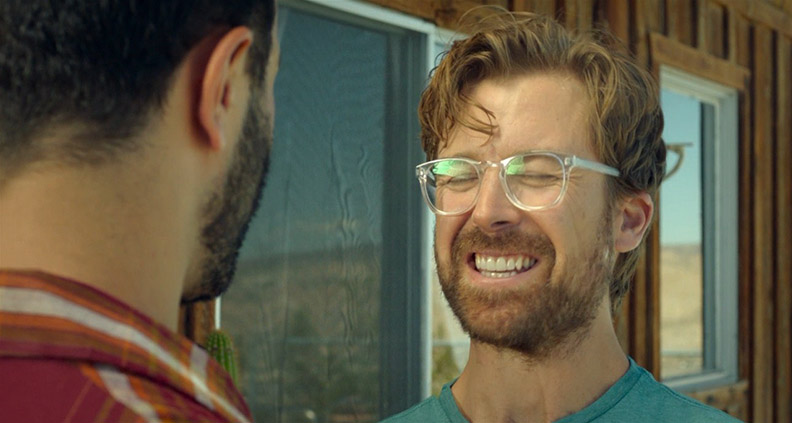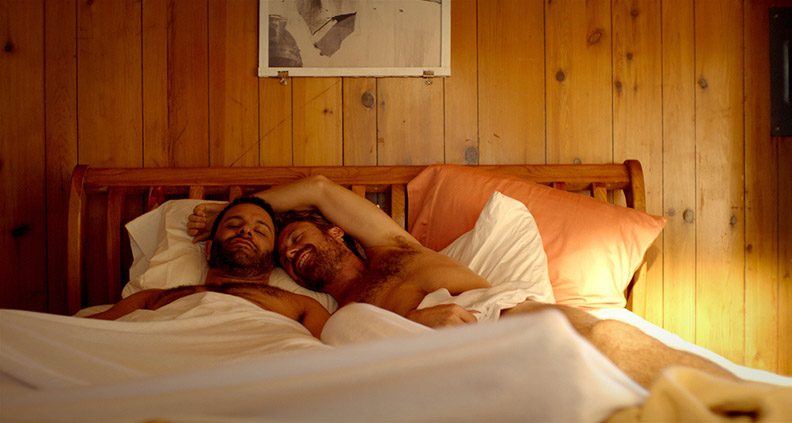Interview: ‘Lazy Eye’ Tim Kirkman on Advice, LGBT Audiences and Using Festival to Your Benefit
According to filmmaker Tim Kirkman, his most recent film Lazy Eye (released in theaters last November and now on VOD and DVD) was the project that finally reconnected the indie artist with his passion for intimate storytelling. The film tells the story of Dean (Lucas Near-Verbugghe), a LA-based graphic designer who finds himself on a romantic weekend getaway in Joshua Tree with the estranged love of his life, Alex (Aaron Costa Ganis). Over the course of the holiday, the two men attempt to make peace with the choices they’ve made and attempt to imagine the possibility of a future together.
Kirkman—a Film Independent Member who was nominated for the Film Independent Spirit Award Truer Than Fiction prize in 1999 for his documentary Dear Jesse—recently spoke with us to discuss how his personal life inspired Lazy Eye’s story, the challenges of working outside of the Hollywood system and how effective the festival circuit can be in getting your best, final cut.

So tell me, what inspired you to write Lazy Eye’s screenplay?
Kirkman: Around the time I turned 40 my eyesight changed dramatically. Which is normal, but alarming. Simultaneously, I went through a period of soul-searching, thinking about past choices and all the people I’d lost contact with. Around the same time I reconnected with an old flame, which was emotionally disruptive to say the least. Lazy Eye was born out of that experience, even though it’s a highly fictionalized version of what actually happened. I wrote the film with a small budget in mind, just two main characters in a romantic setting, with the intention of shooting it quickly. To a large degree, it was inspired Richard Linklater’s Before… series.
How did you cast the leads?
Kirkman: The interesting thing about LGBT audiences is that they don’t care so much if a famous person is in the movie, so it wasn’t crucial for us to cast known actors. Often, investors are only interested if you get a famous name, which wasn’t [what I wanted]. My casting director Judith Sunga was incredibly helpful in showing us a lot of possible lead actors and an extensive search led me to Lucas. He studied at NYU and was perfect for the role of Dean. And Lucas knew Aaron from NYU too, so I met with him and, again, knew immediately that he was right for the role. I’d originally written Alex as Latino, so I ended up having to re-work the role for Aaron—Alex became Greek! The two of them had such amazing chemistry. I was so excited to watch them work together. More importantly, they were game for anything I threw at them and were fully committed to telling the story of these guys without judging them.
What were some of the biggest challenges getting the project off the ground?
Kirkman: Fundraising was definitely the biggest challenge. We shot in both Los Angeles and Joshua Tree in 12 days, so we were going fast and furious. That was a challenge. But I had a great team that was nimble, creative and professional, which made everything better. Plus we were in the desert, so the backdrop was a dream.

Do you have any advice for aspiring filmmakers?
Kirkman: It’s a weird time for independent filmmaking. I think investors and distributors and makers are all struggling to find audiences at a time when, ironically, there are more venues for showing work than ever before. I think monetizing the product is challenging. One practical piece of advice is to screen at a festival or two with audiences and use [those screenings] as a test. Often we don’t have money for market research, so use those screenings as a way to see how the film is playing on a screen with a group of strangers. It’s incredibly helpful. Make sure to build a week of post into the budget and schedule after the festival so you can re-cut and re-mix as necessary. I’ve done that for a couple of my films and—when I’m working independently at least—I’ll always do that. There’s no substitute for a screening with an audience.
What is the most valuable piece of advice you ever received as a filmmaker?
Kirkman: The actor Michael Kelly gave me a great piece of advice about dialogue early in my career. He said whenever a character asks a question, see if you can make it a statement. Excellent advice, because it automatically gives a character an attitude or opinion about something and moves the story away from exposition. The best directing advice I ever got was not to yell “cut” immediately after a scene is over, to keep going, keep filming, even if it is only silence. Sometimes what happens in those moments is where you will find your gold.
Lazy Eye is now available on Amazon, Vudu and GooglePlay. To learn more about the film, visit its Facebook page. For more on Tim Kirkman, check out his website.
Not a Member of Film Independent yet? Become one today. Want more Film Independent? Follow us on Twitter, Facebook and on our YouTube channel.